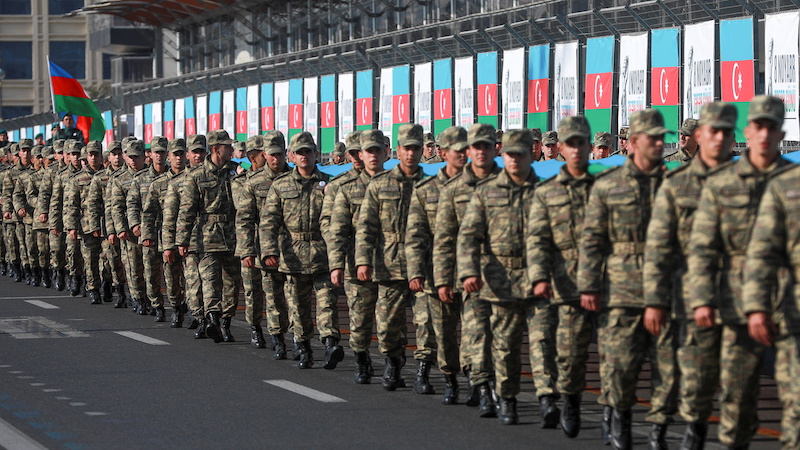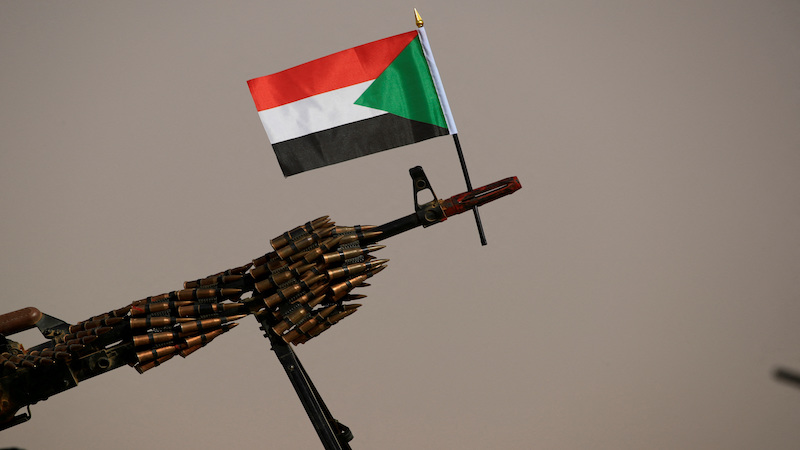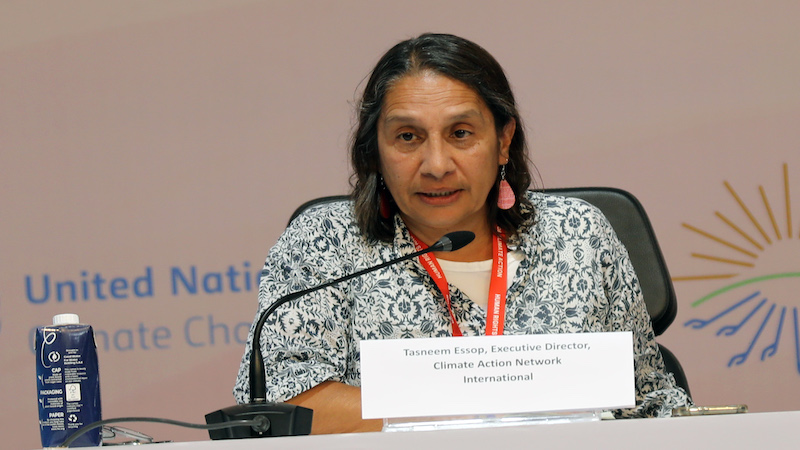Baku wants all countries to lay down arms for the UN climate summit – but doubts grow as warring states sign up and conflicts intensify
COP29 host nation Azerbaijan has proclaimed a lofty ambition for this year’s UN climate summit: pausing the conflicts currently wreaking havoc around the world.
If governments follow Baku’s plan, theatres of war – from Gaza to Ukraine – would fall still next month while diplomats fight over the finer details of climate action under the “COP Truce” vision championed by the Azerbaijan presidency of the November 11-22 COP29 talks.
Baku has spoken proudly of its initiative gaining “significant traction”, with 127 countries and nearly 1,100 non-state groups supporting the appeal so far.
But a list of early endorsers features several warring states, deepening skepticism about the real impact and intentions of the initiative at a time when conflicts – which number more than 50 today – are provoking insecurity and severe humanitarian crises in many parts of the globe.
Speaking to Climate Home, veteran climate campaigners and geopolitical experts criticised the COP Truce as a “performative… PR exercise” and “a distraction” from a separate UN-supported push to strengthen climate action in conflict-affected regions.
Meanwhile, as hopes dwindle of Azerbaijan clinching its own peace deal with neighbour Armenia by COP29, Laurence Broers, associate fellow with Chatham House’s Russia and Eurasia Programme, warned about the risks of the “peace COP brand” looking “empty of content”.
World peace aspirations
Alongside the formal government negotiations, the annual climate summits see COP presidencies launch an ever-growing list of voluntary initiatives, hoping to get as many as possible governments, business groups and civil society organisations to sign onto them.
Azerbaijan has pinned its appeal for a “COP Truce” at the top of its list of voluntary declarations for COP29. Taking inspiration from the Olympic Truce, first established in ancient Greece, Baku wants all fighting parties worldwide to lay down their arms while country leaders and diplomats discuss climate policy.
Modi, Macron, Xi and Biden among many leaders yet to request COP29 speech
The initiative “will highlight the importance of peace and climate action” and “aim to remind all nations of the interplay between conflict and climate change”, the COP29 presidency said.
The centrepiece is a 10-line “solemn appeal”, which governments and observer groups are being urged to endorse.
Its signatories “call on everyone to observe the COP Truce during the month of COP29” – but they are not required to explicitly commit to cease hostilities themselves. “It is a generic appeal for the international community to observe a ceasefire during the COP,” Yalchin Rafiyev, Azerbaijan’s lead negotiator for COP29, told Climate Home at a press briefing.
The inherent paradox is exemplified by some of the early backers of the initiative.
War-waging signatories
Azerbaijan’s Ministry of Foreign Affairs announced that the truce appeal has been supported by all member states of the “Non-Aligned Movement”, a forum of 120 countries originally set up in the Cold War era as a buffer between the United States and the Soviet Union.
The movement counts among its members several countries now involved in bloody civil wars and international conflicts, including Sudan, Myanmar and Palestine.
A Sudanese national flag is attached to a machine gun of Paramilitary Rapid Support Forces (RSF) soldiers. (Photo: REUTERS/Umit Bektas/File)
A COP29 official did not reply to Climate Home’s question asking what concrete purpose the COP Truce initiative would serve given the presence of warring countries among its signatories. But in emailed comments, they said the appeal “is meant to enhance ambition, set aside differences, and prioritize peace and climate action”.
The COP29 presidency has also been enlisting international non-state organisations to support the initiative, alongside governments.
It said nearly 1,100 groups have put their name next to the appeal so far. Climate Home requested a full list of signatories but a COP29 official said that would not be shared until November 15 during COP’s “Peace, Relief and Recovery Day”.
The only publicly available information shows support from around 100 NGOs linked to the Baku-based chapter of the Islamic Cooperation Youth Forum. Listed signatories feature a wide range of predominantly grassroots groups in Central and Southeast Asia, including Uzbekistan’s ‘Council of Young Farmers’ and Azerbaijan’s ‘Erasmus Student Network’.
Scepticism and mild support
Climate Home has surveyed around a dozen international organisations deeply involved in the climate, conflict and human rights agendas at the COP. It found deep scepticism in some quarters – and no more than limited support for the initiative in others.
Tasneem Essop, executive director of the influential Climate Action Network and coordinator of the coalition of environmental non-governmental organisations (ENGO) at the UN talks, told Climate Home that the Azerbaijan presidency had approached the UNFCCC Observer Constituencies – including ENGO – in early September asking them to endorse the truce declaration.
“We had a number of important questions about the practical implications of the declaration and what it meant, for example, for our efforts to spotlight human rights abuses,” she said. “But they did not give us the time to engage properly, so obviously we did not sign on.”
Essop also said that “in its current form, it is a hollow and performative ‘motherhood and apple pie’ declaration that does not deal with the fundamental and systemic issues causing wars and conflict.”
“At best, it appears to simply be a PR exercise,” she added.
On the other hand, the COP Truce appeal has received the support of a different UN constituency representing local government and municipal authorities. Its coordinator Yunus Arikan, director of global advocacy at local government sustainability group ICLEI, told Climate Home they hoped the initiative could have “transformative impacts” despite the “huge challenges that lie ahead”.
“But even if this may not fulfill all its aspirations, we still believe it is a worthwhile effort, as it is a moral duty of all governments and leaders to prevent destruction of our livelihoods, either as a result of climate change or through armed conflicts and wars,” he added.
Conflict blind spot in climate action
Nonetheless, Azerbaijan’s appeal has raised an eyebrow among organisations that have been at the forefront of efforts to put a spotlight on the nexus between climate change and conflict at UN climate summits.
The UAE COP28 presidency last year inaugurated a thematic day dedicated to the connection between climate and peace. It culminated in a detailed declaration through which over 100 governments, NGOs and private-sector institutions committed to scale up climate action, including channeling more investment, in war-torn regions.
London-based think-tank ODI was one of the driving forces behind last year’s declaration, but told Climate Home it won’t be throwing its weight behind Azerbaijan’s ceasefire appeal.
“The COP29 Truce is a nice idea but it’s ultimately a distraction – and one that was always unlikely to succeed, as we saw from the failed Olympic truce earlier this year,” said Mauricio Vazquez, ODI’s head of policy for gl
Read More



